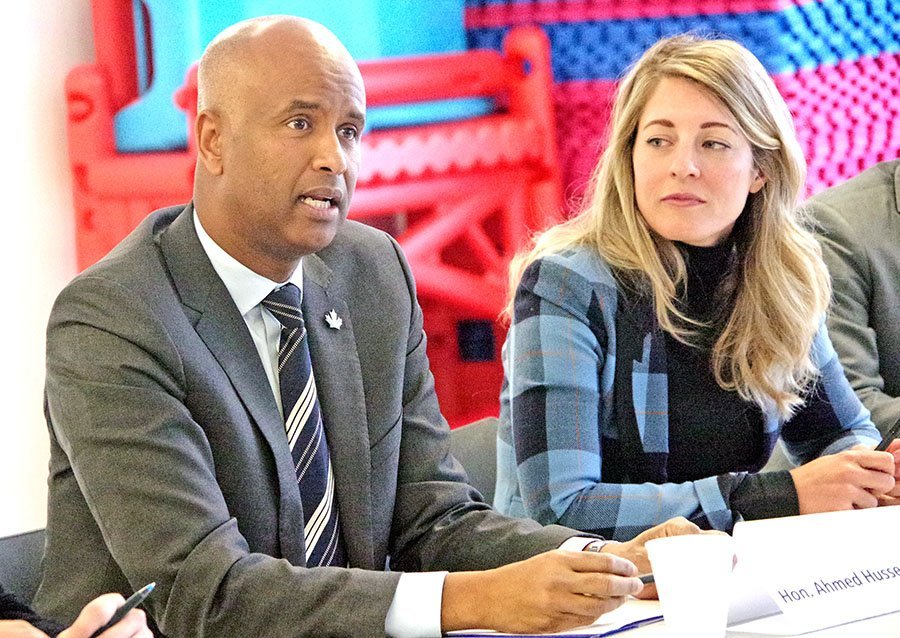
Martin C. Barry
The oft-told story of the engineer who immigrated to Canada only to end up having to drive a cab for a living “is no longer as true as it used to be,” federal Immigration Minister Ahmed Hussen told a gathering of community group leaders at the YMCA in Cartierville last week, as he defended Ottawa’s position on the recognition of academic credentials from foreign countries.
“Maybe it’s true for doctors, but I want to give credit where credit is due,” Hussen said, acknowledging that the medical profession in Canada still has a long way to go in recognizing foreign MD degrees.
All the same, he continued, “Some of the professions have moved – they’ve really moved to address that issue – to give a pathway for people to become licensed. Other professions not so much. And I’m thinking medicine a little bit here.
Obstacles to overcome
“Having said that, we’ve noticed that even with the professions where it’s become – I don’t want to say easier, but there’s a path to licensing and everything is smoother – even in those professions we were seeing that wasn’t the obstacle, but there were other obstacles.”
Hussen – who is himself a product of Canada’s immigration system, having come to Canada from Somalia during the early 1990s – was one member of a panel of elected officials from three government levels who took part in a round-table discussion sponsored by Ahuntsic-Cartierville Liberal MP Mélanie Joly.

Ottawa helping out
Also taking part were Acadie Liberal MNA Christine St-Pierre, Borough of Ahuntsic-Cartierville mayor Émilie Thuillier and Montreal city councillor for Bordeaux-Cartierville Effie Giannou.
While noting that the federal government’s role in the recognition of foreign academic credentials is limited (“The government of Canada doesn’t have jurisdiction strictly on the licensing issue,” he said), Hussen pointed out that Ottawa has been trying to do its part to improve the situation by providing subsidized loans to immigrants who may need to write examinations given by professional associations in Canada, but who may not be in a position to pay the cost.
On CAQ immigration policy
Regarding the new CAQ provincial government’s stated commitment to reducing the number of immigrants entering the province by up to 20 per cent, Hussen said, “They are very adamant about keeping their campaign commitment to cut the numbers.
“But they emphasize a number of things. Number one that it’s a temporary measure, that in about two years they’ll bring the number back. And that they need this pause, as they called it, to take some of the savings from the 20 per cent cut to invest in the 40,000 immigrants that they’ll bring in to help them with integration.

‘We don’t agree,’ said Hussen
“Of course, we don’t agree with that approach. The Prime Minister has been saying that this is not the time for Quebec to cut its immigration, especially when there is such a need in the regions for labor. But having said that, under the Canada/Quebec Accord, Quebec has the decision on economic integration.”
Regarding Quebec’s current view of immigration under the new CAQ government, Hussen said, “They have an idea that they are experimenting with it. They haven’t really flushed it out. They haven’t kind of produced the final document.”
“And they’re thinking of a regionalization approach where they are seeking to use a temporary foreign program to meet the labor demand in the regions and then invest in those people for integration and language training by the Quebec government and then eventually make them into permanent residents and then citizens.”
No interest in temp measures
While maintaining that Ottawa wants to keep the channels of communication open with the CAQ government “to see how we can help them,” Hussen said “we’re not interested in temporary foreign worker programs. We prefer permanent residency, which is what we are having in Atlantic Canada. A program that has really worked well to not only meet labor shortages, but also actually increase the population in places like Nova Scotia.”Mélanie Joly, who is Minister of Tourism, Official Languages and La Francophonie in the Trudeau cabinet, agreed. “The Quebec government doesn’t want to cut economic immigrants,” she said. “Because obviously these are the types of immigrants that the Quebec government wants to actually support. And so the fact that they have under the agreement the jurisdiction only on this particular class is the core of the negotiation with the federal government.”



